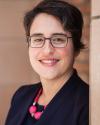Hindi 421 हिंदी ४२१
Urdu 401 اردو 401
Autumn 2021
Who can you recognize?
Instructor: Prof. Jennifer Dubrow
Office: M212 Gowen Hall [note: on Mezzanine level, above 2nd floor]
Email: jdubrow@uw.edu
Office Hours: TTh 4:30-5 PM and by appointment
Zoom ID for Office Hours: https://washington.zoom.us/j/91832316781
Class Times and Place: MW 2:30-4:20 PM.
Zoom link for class: https://washington.zoom.us/j/96804757043
Overall Goals for Quarter and Year. This course counts as 4th-year Hindi (Hindi 421) and 4th-year Urdu (Urdu 401). Because Hindi 421 comprises the short story component of the Advanced Hindi sequence (Hindi 421-422-423-424), this quarter we will focus on the short story, one of the premier genres for 20th-century writing in both Hindi and Urdu. This quarter we will focus our course on two parts. In the first half, we will focus on writing by the great Hindi-Urdu short story writer Saadat Hasan Manto (1912-1955). In the second half, we will study the "New Story" (Nayi Kahani) movement in Hindi, a modernist movement most active in the 1950s. We will read representative stories from the movement.
Grading: The final grade for Hindi 421/Urdu 401 is based on the following factors:
- Preparation of the readings before class and participation in class (40%)
- Bi-weekly written responses of 1-2 pages each (40%)
- Final project (20%).
Note on Zoom. Due to COVID-19, this quarter will be taught almost exclusively online using Zoom. There are links to the Zoom meetings for this class on the Zoom portion on Canvas (see Zoom on the menu on the lefthand portion of your screen). Office hours will also be conducted during Zoom.
Some tips about Zoom best practices:
- Please be sure to mute yourself when not speaking.
- The UW recommends that you create a dedicated space where you live for participating in online classes.
- Feel free to use the Chat function to communicate with the instructor or the class as a whole as we work.
Face Coverings in the Classroom. The health and safety of the University of Washington community are the institution’s priorities. Please review and adhere to the UW COVID Face Covering Policy [pdf].
For students outside the US. Faculty members at U.S. universities – including the University of Washington – have the right to academic freedom which includes presenting and exploring topics and content that other governments may consider to be illegal and, therefore, choose to censor. Examples may include topics and content involving religion, gender and sexuality, human rights, democracy and representative government, and historic events.
If, as a UW student, you are living outside of the United States while taking courses remotely, you are subject to the laws of your local jurisdiction. Local authorities may limit your access to course material and take punitive action towards you. Unfortunately, the University of Washington has no authority over the laws in your jurisdictions or how local authorities enforce those laws.
If you are taking UW courses outside of the United States, you have reason to exercise caution when enrolling in courses that cover topics and issues censored in your jurisdiction. If you have concerns regarding a course or courses that you have registered for, please contact your academic advisor who will assist you in exploring options.
Plagiarism and Academic Honesty. Students are expected to abide by all University of Washington regulations concerning plagiarism and academic honesty. Plagiarism is defined as using in your own work the creations, ideas, words, inventions, or work of someone else without formally acknowledging them through the use of quotation marks, footnotes, bibliography, or other reference. Please check with your instructor if you have questions about what constitutes plagiarism. Instances of plagiarism will be referred to the Vice Provost/Special Asst to the President for Student Relations and may lead to disciplinary action. It is your responsibility to be aware of the university's standards for academic conduct. A good summary can be found at: http://depts.washington.edu/grading/pdf/AcademicResponsibility.pdf (Links to an external site.).
Disability Accommodation. If you would like to request academic accommodations due to a disability, please contact Disabled Student Services, 448 Schmitz, Box 355839, (206) 543-8924 (V/TTY), or uwdss@u.washington.edu. If you have a letter from Disabled Student Services indicating you have a disability that requires academic accommodation, please present the letter to me on the first day of class so we can discuss the accommodations you might need.
Religious Accommodations. Washington state law requires that UW develop a policy for accommodation of student absences or significant hardship due to reasons of faith or conscience, or for organized religious activities. The UW’s policy, including more information about how to request an accommodation, is available at Religious Accommodations Policy (https://registrar.washington.edu/staffandfaculty/religious-accommodations-policy/) (Links to an external site.). Accommodations must be requested within the first two weeks of this course using the Religious Accommodations Request form (https://registrar.washington.edu/students/religious-accommodations-request/) (Links to an external site.).
